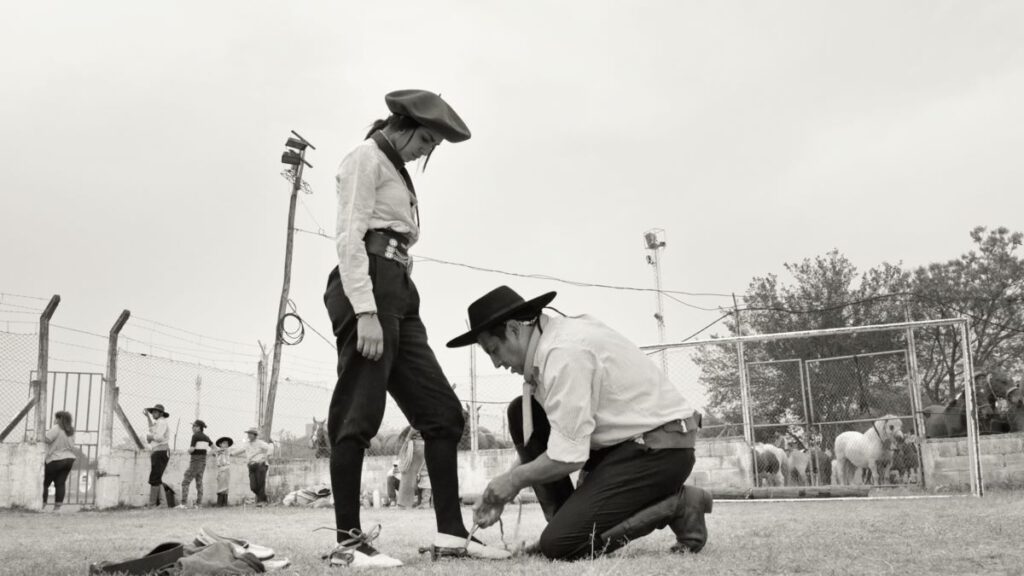Perhaps it’s just luck of the draw in how my assignments fell out this year, but my Sundance was more doc-heavy than usual, including standouts like Chris Smith’s “Devo” and the new version of Ondi Timoner’s fantastic “Dig!” My favorite non-fiction film that I saw from Sundance this year was also the least traditional, a gorgeously shot rendering of a culture and lifestyle that’s dwindling away on the edge of society. Directed by the great Gregory Kershaw and Michael Dweck (“The Truffle Hunters”), “Gaucho Gaucho” is such a verité slice of life that someone who stumbled upon it on cable would probably presume it was a narrative piece of work. Lensed by the directors, “Gaucho Gaucho” is the most visually striking film I saw at Sundance this year, a reminder that documentaries can have cinematography that rivals their narrative counterparts, and that film will always be a visual medium, even when it’s telling a true story.
Kershaw and Dweck have traveled to Argentina for their latest film, finding people who live far off the grid, wearing garb that looks like cowboys and living off the land. Their window into this world is largely observational—no on-screen stats, talking heads, etc.—but narratives and themes start to emerge organically through the filmmaking. We see a young woman told she has to wear a uniform at school instead of the clothes of her culture. We return regularly to an 83-year-old gentleman named Lelo, including a scene in which he essentially asked to be “measured” to see if he’s still young enough to provide any value. There’s a shot of this cowboy riding the land that’s simply masterful, a shot that feels like it could be a stand-out in any Western about a hero going on one of his last rides.
With smart use of music that amplifies the transportive power of the film, Kershaw and Dweck carefully allow their subjects to simply be, never pushing them into a forced commentary that could have turned the film into a cautionary history lesson. They’re also careful not to overplay the outsider angle of the story, countering the octogenarian with a young boy who’s eager to learn about his people and a teen girl who is trying to push some of the gender boundaries of her people. Traditions don’t end in a culture like this as much as they shift and grow. By giving these people a visual language this strong, “Gaucho Gaucho” elevates this tradition into high art. But it already was for the people who live it.

Brett Story and Stephen Maing’s “Union” employs a similar style in that most of its power comes from simply observing what unfolds in front of the camera instead of interjecting commentary on top of it. It’s a well-made reminder of the power of unions in this country, along with how difficult they can be not only to get off the ground but maintain structure and strength. We have seen a great number of documentaries about the power of American workers, but this one really captures the internal struggles in organizations like this, where it can be difficult to find people who all agree on the same strategy and message. Jumping in long after the Amazon Labor Union tried to get off the ground and arguably ending just as their story is getting truly interesting, “Union” can be a little frustrating in its narrow scope, but it’s still worth a look. I hope they put it on Prime Video.
The “star” of “Union” is the charismatic Chris Smalls, a former Amazon employee at its massive Staten Island warehouse, and the leader of a new union movement. As we all know full well by now, working conditions for Amazon employees are atrocious, at least in part because of how little collaborative negotiating can be done on behalf of the workers forced to work impossible hours. One of the ways that Amazon has gotten around the formation of unions at their company is through such incredible turnover that by the time a petition to form a union is complete, many of the signatures are invalid because the employee is no longer active. It’s a revolving door system that makes it impossible for workers to fight for what they deserve. Smalls and a team of like-minded activists are doing everything they can to fix this system, working hard on the ground while Jeff Bezos is in space—it’s not accidental that “Union” opens with the Amazon CEO’s journey as far away from his workers as one could possibly go.
Story and Maing’s film is more about union strategy than worker conditions, and it struggles a bit by virtue of its limited approach that keeps it locked in a relatively small time frame and specific place. The fight, and others like it, didn’t start or end here, which gives the film a bit of a snapshot approach that might feel incomplete to some. Having said that, the most interesting aspect of “Union” may be the reminder that these fighters are human too. Watching them fight over leadership roles and even meeting start times makes it clear how hard it can be to get so many passionate people on the same page for the same cause. It’s almost as hard as going to space.

Finally, there’s the somewhat divisive “Skywalkers: A Love Story,” a film with striking, impossible visuals that have never been on film before but a story that feels too manufactured and arguably even dangerous for this critic. I don’t need my films, documentaries or otherwise, to take a moral high ground, but “Skywalkers” opens that door by casually mentioning that dozens of people are killed or injured every year doing what happens in this film, and then completely brushes off the fact that this “love story” is about two influencers who have clearly encouraged their followers to trace their footsteps merely by making it look as thrilling and unforgettable as they do. Even if one gets past that ick factor as quickly as the filmmakers seem to do, there’s a hyper-stylized and even scripted nature to “Skywalkers” that makes it all feel a bit too much like a commercial. An ad for something insane.
Jeff Zimbalist and Maria Bukhonina’s film is about a pair of Russian climbers named Angela Nikolau and Ivan Beerkus, a daredevil couple who have climbed some of the world’s tallest buildings in search of that perfect GoPro or drone shot. The bulk of the film consists of their planning to tackle a massive skyscraper—planning how to get past the guards and to a spire, where they plan to perform an insane stunt over 2,000 feet above the ground. The planning takes place against the backdrop of their love story, one that has its traditional ups and downs, along with the less traditional ones that come with dating a daredevil.
Some of “Skywalkers” is undeniably gorgeous as these people are going places that people and cameras have never gone before. The best aspects of Zimbalist and Bukhonina’s film captures how cityscapes can be gorgeous, but the whole project is weighed down by clearly scripted soundbites from its leads. “I made a rule—never depend on anyone but myself” or “Our full potential is on the other side of fear” are the kind of lines that would make eyes rolls in a narrative feature about Nikolau and Beerkus, and I constantly wanted a version of this film that grounded its leads instead of allowing them to stay shallow. A journey to these heights only has value because the people return to the earth in one piece, and this telling falls too in love with the altitude to remember that fact.












